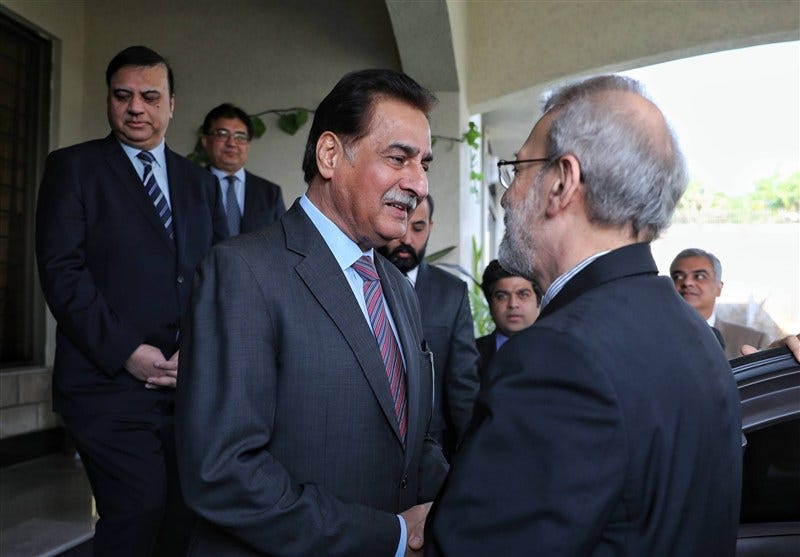Larijani’s Mission to Pakistan: The Supreme Leader’s Message and Key High-Level Meetings
Larijani Meets Pakistan’s President, Parliamentary Leaders, and Foreign Minister to Strengthen Security, Political, and Economic Coordination
Pakistan, PUREWILAYAH.COM — In a significant diplomatic mission underscoring Iran’s expanding regional engagement, Ali Larijani, Secretary of Iran’s Supreme National Security Council, held a series of in-depth meetings with Pakistan’s top leadership on Tuesday. His discussions with President Asif Ali Zardari, parliamentary officials, and senior government figures focused on regional security, economic cooperation, and coordinated efforts by Islamic countries to confront mounting geopolitical challenges—particularly the continuing threat posed by the Israeli regime.
During the trip, Larijani also delivered a special message from Ayatullah Sayyed Ali Khamenei, Leader of the Islamic Revolution, to the people of Pakistan.
In his public statement, Larijani said:
“I convey the greetings of the Leader of the Islamic Revolution of Iran to the noble people of Pakistan— a nation that defended Iran responsibly during the recent unjust war waged by the Zionist regime.”
He stressed that Pakistan’s stance reflected its principled and firm national character, and extended Iran’s appreciation to Pakistan’s government, parliament, and armed forces for their responsible position during this period.
Larijani’s visit represents one of the most comprehensive rounds of Iran–Pakistan high-level consultations in recent years, reflecting both nations’ shared intention to elevate their relationship to a strategic partnership.
Meeting With President Asif Ali Zardari: Consolidating a High-Level Political Understanding
Larijani’s main engagement was his meeting with Pakistan’s President Asif Ali Zardari. According to Iranian and Pakistani diplomatic sources, the talks were described as “constructive and substantive,” covering:
Joint approaches to regional security crises
The role of Islamic governments in responding to external threats
Strengthening Tehran–Islamabad coordination at international forums
Expanding security and intelligence dialogue
Addressing border stability and counterterrorism efforts
Both sides agreed that Iran–Pakistan relations must adapt to the region’s rapidly changing dynamics, with the president reportedly affirming Pakistan’s willingness to deepen cooperation with Iran across political, security, and economic dimensions.
Consultations With the Speaker of Pakistan’s National Assembly
In a separate meeting, Larijani held extended talks with Sardar Ayaz Sadiq, Speaker of Pakistan’s National Assembly. The meeting focused on:
Enhancing parliamentary diplomacy between the two countries
Institutionalizing regular dialogue between legislative bodies
Developing frameworks for joint parliamentary committees
Coordinating positions on key issues affecting the Islamic world
Both sides examined recent developments in West Asia, including the deterioration of regional security, the rise of extremist threats, and the need for stronger Muslim unity in countering the actions of the Israeli regime.
Larijani emphasized that parliament-to-parliament engagement would play an essential role in cementing strategic cooperation.
In-Depth Talks With Deputy Prime Minister and Foreign Minister Ishaq Dar
Larijani also met Mohammad Ishaq Dar, Pakistan’s Deputy Prime Minister and Foreign Minister, for intensive discussions regarded as one of the visit’s central pillars.
The two officials reviewed:
The latest regional flashpoints, including the war in Gaza, political instability in Afghanistan, and security threats across West Asia
Collective mechanisms for Islamic countries to manage emerging crises
The need for coordinated diplomatic action against the Israeli regime’s aggression toward Muslim nations
Potential frameworks for Iran–Pakistan security and defense cooperation
Roadmaps for expanding economic and energy collaboration
Both sides described Palestine as a central axis of Islamic cooperation, stressing the responsibility of major Muslim nations to provide unified support.
Economic Cooperation: Aiming for $10 Billion in Bilateral Trade
Larijani underscored that the current level of Iran–Pakistan economic engagement falls short of the two countries’ capacity.
He emphasized:
The importance of removing structural and banking barriers
The need to strengthen border trade infrastructure
Joint initiatives in energy, electricity, and transit corridors
Opportunities for industrial partnerships and investment exchanges
Larijani stated that achieving $10 billion in annual bilateral trade is realistic if both sides prioritize economic diplomacy. Pakistani officials reportedly expressed readiness to explore new economic channels and accelerate the process of resolving existing obstacles.
Shared Vision on Regional Security
Throughout the meetings, Larijani reiterated Iran’s position that instability in the region is strongly tied to the policies of external actors, with the Israeli regime posing a persistent threat to Muslim nations.
Both sides agreed that:
The Islamic world must adopt practical and coordinated strategies
Regional crises demand unified political messaging
Islamic countries must strengthen self-reliance in security and defense
Iran and Pakistan play a central role in shaping regional stability
Larijani also highlighted the importance of Afghanistan’s stability and the necessity of joint efforts to counter cross-border terrorism.
Arrival Remarks: Emphasis on Historic and Cultural Bonds
Speaking to reporters upon arrival in Islamabad earlier in the day, Larijani described Pakistan as:
“A major regional country with a distinguished role in shaping security developments”
“A culturally influential neighbor with deep civilizational ties to Iran”
He stressed that in the current dynamic regional climate, Iran–Pakistan cooperation is essential for fostering stability and peace across West Asia and South Asia.
Larijani expressed hope that the discussions throughout his visit would generate concrete outcomes and enhance long-term coordination.
Conclusion: Momentum Toward a Strategic Partnership
At the end of the day’s engagements, Iranian and Pakistani officials affirmed their readiness to:
Maintain regular high-level consultations
Establish follow-up mechanisms to implement agreements
Expand political, security, and economic cooperation in a structured manner
With regional tensions escalating and the geopolitical environment undergoing rapid transformation, both Tehran and Islamabad appear committed to moving their relationship into a more coordinated, strategic, and future-oriented phase. (PW)





